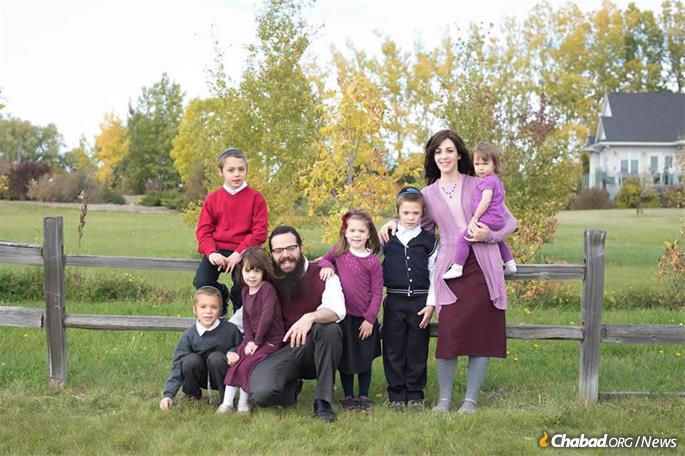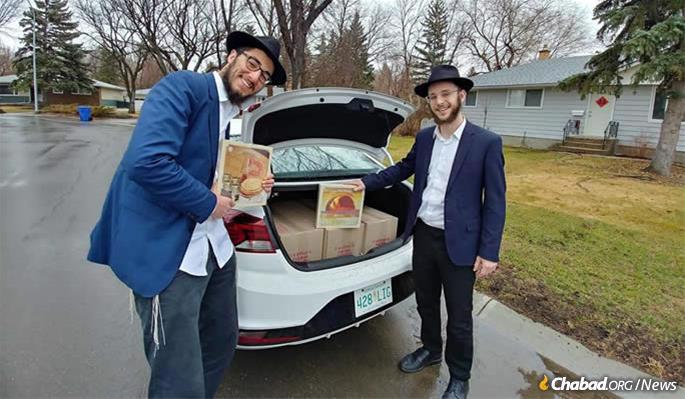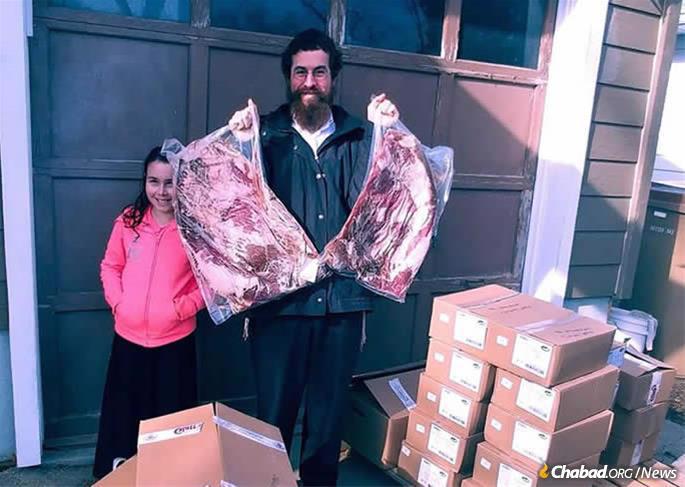Passover planning when you live in the prairie lands in Saskatchewan, Canada, isn’t as simple as getting in the car and driving to the nearest supermarket. Not that there aren’t supermarkets in the city of Saskatoon, it’s just that the number of kosher items available is fairly limited.
Add the challenges of caring for a newborn baby and a birthday boy who’s turning 9 (and hoping for a “real” cake), not to mention a Passover seder that will be attended by 50 of your friends and neighbors and, well, you can imagine the happy challenge facing Rabbi Raphael and Sarah Kats, co-directors of the Chabad Jewish Centre of Saskatoon, as they prepare to celebrate Passover, which begins on Friday night, April 19.
To ensure they have everything they need, the couple has to plan everything ahead of time and arrange for special food deliveries.
“My husband does all the ordering, but we discuss beforehand what we want or need, and for how many months the order will be for. For instance, wine we will order now for the whole year. We will look at the past year and say did we have enough of this or too much for that, and will we have the same number of guests as other years?” says Sarah Kats.
This year, that order includes 300 pounds of chicken (some will be going to local families), 500 pounds of meat and more. The food, which will last for several months, will be stored in the Kats’ three chest freezers.
Before placing their order, though, they also coordinate with Rabbi Avrohom and Shterna Simmonds, the Chabad emissaries in Regina, Saskatchewan, Canada, about two-and-a-half hours to the south. “We call it the Bobov order,” she continues, referencing the name of a Chassidic group. “The Bobov community in Toronto provides kosher-for-Pesach materials at really good prices. You have to order right after Purim, as they get the food from New York and have a cutoff date for orders.”
The food will be trucked to the Simmondses, who will arrange to meet up with the Kats family in some small town along the way to Saskatoon so they can pick up their food. The couple can also get items from the Jewish community in Edmonton, five hours to the west. While the availability of kosher products has increased in recent years—and with Passover specific items like matzah, macaroons and perhaps a bottle of kosher wine or two found in stores from the Ozarks to the Wyoming countryside—many kosher consumers still have to do plenty of pre-planning to ensure they have all they need, particularly when it comes to glatt-kosher meats, chicken and dairy products.

In Bozeman, Montana, several Jewish families arrange for an 18-wheeler from a large Midwestern Jewish community to bring in kosher meat and chicken in advance of Passover. They meet the truck at a rest area just off the highway and transfer the boxes of food into their vehicles. “I can place an order and get anything shipped,” said one Montana resident, but “you really have to think about it and be deliberate with what you order.”
Passover is perhaps the most shopped-for Jewish holiday of the year with 40 percent of kosher-food sales coming in advance. An estimated $1.5 billion will be spent by consumers this season, according to the marketing firm Lubicom, which holds the annual Kosherfest trade show.
Rabbi Zalman and Raizy Mendelsohn in Wyoming have ordered “pallets” of meat—enough to last their young family for a while and to feed the more than 80 guests they are welcoming for Passover seders. Only an estimated 1,500 to 2,000 Jews are believed to be living in the state, with the largest concentrations centered in Jackson Hole, Cheyenne and Laramie. They’ve also sent shmurah matzah for the Passover seders to the Jewish residents they know throughout the state.
When Chabad.org reached Rabbi Yonah Grossman, co-director of Chabad Jewish Center of North Dakota with his wife, Esti, he was preparing for a four-hour drive with his children to a kosher supermarket in Minneapolis to do some last-minute Passover shopping for his family and several other families who keep kosher in his state.
While some Jews lament the number of items that are off-limits on Passover, Chabad families, many of whom traditionally do not use processed foods on the holiday, say that tradition makes things easier for them.
“It’s not a hardship,” says Grossman, “because on Pesach we make everything from scratch.” Also, he notes that potatoes, eggs, onions—the basic dietary staples of the holiday—are all grown in North Dakota, which is also the No. 1 producer of wheat in the United States, a necessary ingredient for matzah-making.

Sarah Kats agrees, noting that the Simmonds family in Regina got a shipment of fresh ground fish from Winnipeg, so homemade gefilte-fish balls are on menu for the seder, as is chicken soup, brisket, potato kugel, roasted vegetables and a fruit sorbet. It’s a menu reminiscent of her own childhood Passovers.
“The Chabad standard that we kept growing up was pretty minimal, and we keep that now. We never grew up with canned or prepackaged foods,” she says. “When my mom is here for Pesach, she actually says, ‘Wow, I don’t feel like I’m missing anything!’ ”
As for the birthday boy, the Kats family will celebrate a little earlier than usual this year, so that their son can enjoy a chametz cake made especially for him.








Join the Discussion